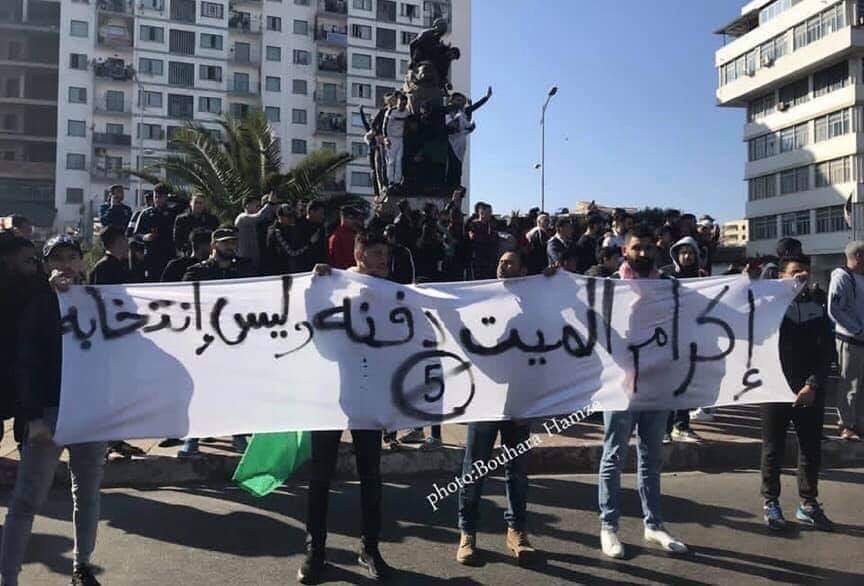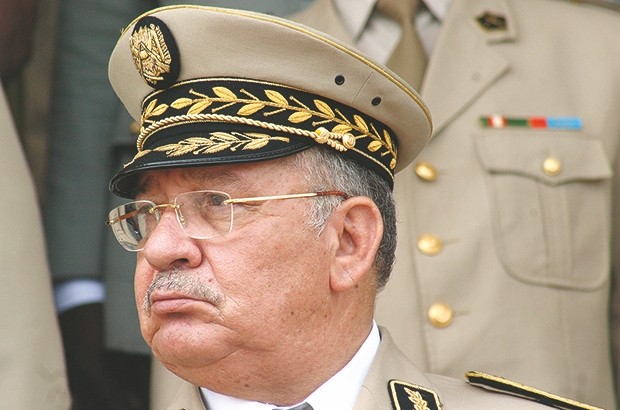
When the Arab Spring uprisings broke out in 2011 there were riots in Algeria, as elsewhere in the region. But while the leaders of three neighbouring countries – Tunisia, Egypt and Libya – were toppled the regime of Abdelaziz Bouteflika survived relatively unscathed.
Although Algeria had similar socio-economic problems to its neighbours and similar reasons for people to revolt, the regime was able to buy off discontent, thanks to its oil and natural gas resources. A decision to lift the 19-year-old state of emergency probably helped too, as did bitter memories of the country's armed conflict in the 1990s that cost 100,000 or more lives.
Now, however, the regime is facing a new challenge. During the last week there have been widespread protests calling on President Bouteflika to step down and this time they may not be so easy to quell.
The trigger for these protests was a decision by the ruling FLN party, supported by other sections of the political establishment, to adopt Bouteflika as its candidate for the presidential election in April.
By the time of the election Bouteflika will have been in office for 20 years and, in the absence of any credible alternative candidates among the opposition, he is almost certain to win a further five-year term.
The problem with this is that no one seriously expects Bouteflika to be running the country if he wins. His poor state of health makes him incapable of doing so but keeping him in office, if not in power, postpones the question of what to do about a successor for a few more years.
Bouteflika – currently in Switzerland on one of his frequent medical trips abroad – is 81, uses a wheelchair following a stroke in 2013 and is rarely seen in public. Critics refer to him as "The Mummy" and "the living dead". Banners seen during the current protests say: "Respect the dead man by burying him, not electing him."
In effect, anyone who votes for Bouteflika will be voting for the shadowy and unaccountable figures known as Le Pouvoir who wield actual power behind the scenes – including the president's influential youngest brother, Said.
Another cause of resentment is that this will be Bouteflika's fifth term and a crossed-out number five has become a prominent symbol in the protests. When he first became president, in 1999, the constitution stated that he would be limited to two terms. Parliament later changed the rules, however, allowing him a third and and fourth term.
A revised constitution introduced in 2016 brought back the two-term limit but, in the process, reset the clock. Thus it can be argued that his current fourth term is his first under the 2016 constitution and he is therefore entitled to another one. (The late Ali Abdullah Saleh used new constitutions in a similar way in Yemen to overcome term limits and extend his presidency.)
For the regime, Bouteflika's continued presence represents stability. His departure could easily disturb the balance of political, military and business interests that some describe as a "mafiocracy".
Another important element in this is Algeria's clan system and the power-sharing arrangements that have developed around it. The clans have an informal role in decision-making and also negotiate among themselves for government positions, economic benefits and other favours. Bouteflika represents the western group of clans while Gaïd Salah, the 79-year-old army chief of staff represents the eastern group.

The regime's main claim to legitimacy hinges on its role in the struggle against French colonialism – a struggle in which Bouteflika played an active part. But as time goes on that is becoming less and less relevant. Most Algerians today don't remember the war of independence which ended in 1962 and its heroes are dying out.
Meanwhile, the regime is less well-placed than it was in 2011 to buy off discontent. Since then, crude oil prices have fallen from $94 a barrel to $53 – and the state depends on hydrocarbons for 60% of its revenue. Francesca Caruso writes:
"In four years, Algeria’s foreign reserves have fallen from 178 billion US dollars to 90 billion. According to the International Monetary Fund, in 2017 the North African country’s economy grew by just 1.6%, youth unemployment stood at 28% and 10% of the population was at risk of falling back into poverty ...
"Among Algerians aged 18–24, nearly two-thirds of men and a third of women are thinking about emigrating for economic reasons or due to a combination of economic and political factors."
Despite that, the regime benefits from the fact that opposition elements are fragmented and so far have been unable to mount a serious challenge. The current protests are an expression of general disaffection, focusing on opposition to Bouteflika's fifth term, but they are not based on any particular ideology or advocating a specific solution.
The regime has also been trying to stir up fears of what might happen if the street demonstrations continue. Up to now, the protesters have been basically nonviolent and in some places have fraternised with the police and given them flowers. This led prime minister Ahmed Ouyahia to issue what might be interpreted either as a warning or a threat. "In Syria," he said, "the protests began with flowers then ended in blood."
It looks as though the regime intends to sit it out over the next six weeks in the run-up to the election – if only because it can't agree internally on any other course. Presumably the hope is that things will quieten down again once Bouteflika has been re-installed as president. But it may not be quite so simple.
According to the constitution, a newly-elected president cannot take office before being sworn in. This has to be done within a week following the election, with the president reciting the oath "in front of the people and in the presence of all the high authorities of the nation".
It's not at all clear whether Bouteflika's health will permit that. In this context it's worth recalling a situation that occurred in Kuwait in 2006 when the emir died and his crown prince, Sheikh Sa’ad, was named as the new ruler. However, it appeared that Sheikh Sa’ad was incapable of reciting the oath (he is thought to have been suffering from Alzheimer's disease) and he was eventually declared unfit for office.
There is also the possibility that Bouteflika's health might worsen further after taking office. If "a serious and lasting illness" prevents him from fulfilling his duties, the head of the upper house of parliament can take over temporarily, for a maximum of 45 days. However, that can only happen if both houses of parliament agree to it by a two-thirds majority (this latter provision seems to be aimed at preventing a "medical coup" of the kind that was used to oust the ailing President Bourguiba of Tunisia in 1987).
If Bouteflika continued to be officially classified as unfit for more than 45 days he would be deemed to have resigned and a new president would have to be elected within 90 days.
It seems likely, therefore, that even if he is re-elected controversy about his fitness for office will continue and perhaps increase. Meanwhile we can expect tensions to grow within the regime as those who have ambitions jostle for position.

 RSS Feed
RSS Feed
